#eSafety Commissioner
Text
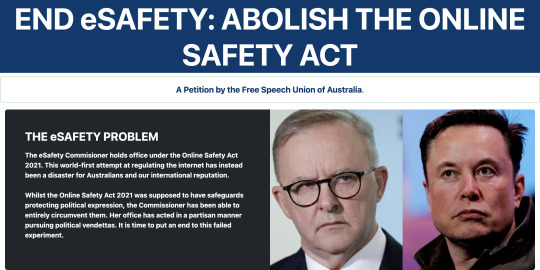
THE eSAFETY PROBLEM
The eSafety Commisioner holds office under the Online Safety Act 2021. This world-first attempt at regulating the internet has instead been a disaster for Australians and our international reputation.
Whilst the Online Safety Act 2021 was supposed to have safeguards protecting political expression, the Commissioner has been able to entirely circumvent them. Her office has acted in a partisan manner pursuing political vendettas. It is time to put an end to this failed experiment.
Commonly asked questions
Q. What is the Online Safety Act 2021?
The Online Safety Act is the primary legislation that governs the 'eSafety Commissioner'. It provides a range of powers that allow for content to be ordered to be removed from the internet.
Q. What has gone wrong with the Online Safety Act 2021?
In short, it has been misused. Rather than protecting the public, the eSafety Commissioner has engaged in removing material for political purposes. People who have been genuinely subject to abuse have not been protected, whilst her office has waged political crusades. The result has been to undermine Australian democracy and damage Australia's international reputation.
Q. The Online Safety Act 2021 has safeguards? Surely they could stop this?
Unfortunately, with these types of powers, the safeguards are easily avoided. The Commissioner fails to give notice to all the affected people, thus limiting challenges. Her office also simply ignores many of the constraints in the legislation, including the requirement that she is not entitled to intervene with the implied freedom of political communication.
Q. Who is behind this petition?
The Free Speech Union of Australia. We exist to protect and promote Freedom of Expression for all Australians. To find out more, follow our Twitter feed, or visit our website, where you can join us.
Q. What will happen with signatures?
We will deliver a list of names and postcodes to Parliament in due course. Your email address information will only be known to the Free Speech Union of Australia.
Further questions about the eSafety Commissioner
Q. Doesn't eSafety keep people safe on the internet? Why would you abolish them?
The claims that the eSafety Commissioner is effective at keeping people safe on the internet is a myth. They have issued very few formal notices. For children, she issued a grand total of 13 notices in the space of a year, which were letters to School Principal's telling them to stop particular children bullying others.
The 'informal' investigations are also ineffective. It is easier to report directly to platforms, rather than contacting the eSafety Commissioner. Here's an illustration.

Q. Hang on, the eSafety Commissioner says that they do ten's of thousands of investigations a year? Is that true?
It depends what you consider to be an 'investigation'. If reading a report saying a post is 'bad' and taking a few minutes to decide if that complaint is justified counts as an investigation, then the Commissioner is right.
The truth is that this activity is done millions of times a day by each social media provider, when they moderate posts, one can see the scale in the European Union's own database. On that basis, we would say the the eSafety Commissioner is considerably exaggerating what they do.
Q. How is the eSafety Commissioner a threat to the internet and democracy?
Her approach is authoritarian. You don't need to take our word for it. The Electronic Frontier Foundation has said that the injunction she sought "set[s] a dangerous precedent that could legitimise practices of authoritarian governments, which do not fully value the rights to freedom of speech and access to information."
They also noted that her approach risks "a fragmented and splintered internet, undermining freedom of expression and access to information worldwide".
In the XCorp proceedings, she has also been alleged to exceed her jurisdiction, in other words, purport to exercise legal powers she does not have. We are also aware of her failing to give end users notice of their appeal rights (thus making it impossible for them to challenge). This makes her conduct even more worrying.
Q. How can we keep children safer on the internet without the eSafety Commissioner?
There are many answers. It starts with parental responsibility and controlling the use of devices. For example, it is possible for parents to take steps to keep children away from social media, or limiting access at the device level.
The idea that an eSafety Commissioner will help by taking down content is untrue. In respect of genuine abuse, existing platforms have very powerful incentives. Advertisers do not wish to see their content next to porn, or genuine cyber-abuse. Unfortunately, the eSafety Commissioner spends their days targeting other material, including lawful political speech.
If there is a need for the issue of take down notices, then this should be done judicially, following a professional process. For example, New Zealand's process has the safeguard of requiring this to be done with a judicial officer involved, as well as a technology expert to advise on appropriate action. Australia has one unaccountable person attempting to do this, namely the eSafety Commissioner.
Q. What is happening in the X case that is currently before the Federal Court of Australia?
The eSafety Commissioner obtained an temporary injunction seeking to enforce its original notice to take down a video of Mar Mari Emmanuel. X have challenged this injunction, as well as the underlying notice.
The legal arguments primarily concern:
What content the eSafety Commissioner is entitled to ban as likely being 'Refused Classification' content.
What steps are 'reasonable' for X to take the material unavailable to Australians.
Whether there was a valid notice to begin with.
We expect these arguments and the parties positions will evolve throughout the case.
Q. What is the main difference between X's case and Billboard Chris's case?
They are under different sections of the Act. In X's case, the Commissioner claimed it was due to the video likely being 'RC' (or Refused Classification) rated content, and thus should be taken down. The main error is that it is unlikely to meet that standard.
In Billboard Chris's case, the claim is that it was 'adult cyber abuse', namely content targeted at an individual (Teddy Cook), with a view towards causing him serious psychological harm. The main legal error is that the removal notice was aimed at material that does not meet the statutory definition of adult cyber abuse. It was not targeted at an Australian adult and was a relatively mild political statement. There was nothing obscene or violent about it.
As it does not meet the statutory definition, the Commissioner simply had no jurisdiction to issue the notice.
Q. What does X's case and Billboard Chris's case have in common?
They reflect the same conduct of the eSafety Commissioner in exceeding her jurisdiction and misunderstanding her powers. They also both illustrate the risks of setting up an eSafety Commissioner and giving one person the purported power to police the internet.
==
Australia's "eSafety Commissioner" is a known disgruntled ex-Twitter employee with an authoritarian streak, who has a vendetta against Elon Musk, and is abusing her unnecessary position to wage her personal war.
If you're an Australian and care about free speech and opposing censorship, sign the petition from the Free Speech Union of Australia.
#Free Speech Union of Australia#Australia#Free Speech Union#Julie Inman Grant#censorship#eSafety Commissioner#free speech#freedom of speech#internet censorship#authoritarianism#religion is a mental illness
6 notes
·
View notes
Text
Just in time for May 3 being World Press Freedom Day a story about the Australian government warning women for correctly sexing a man
An Australian woman was reported to police after making posts on social media about a male who identifies as transgender participating in the women’s football league. Kirralie Smith was visited by New South Wales Police after speaking to media about Riley Dennis, a trans activist who had been the subject of mass complaint last month after reportedly injuring female players.
Police visited Smith on March 30 and handed her an Apprehended Violence Order (AVO) requiring that she does not discuss or approach Dennis – despite the fact that Smith lives over 200 miles from Dennis. The AVO acts as an interim order that will stand until a hearing later this month, at which point the court will decide whether it is justified.
Smith, a spokeswoman with an organization established to combat gender ideology, has been a vocal critic regarding gender self-identification in sports. Earlier this year, Smith mobilized supporters to participate in an email campaign that resulted in a total of over 12,000 complaints being submitted to authorities at Football New South Wales (FNSW). The complaints were largely related to Dennis, who is alleged to have injured female players at a match in March.
Speaking with Reduxx, Smith explained that she believed the AVO was carried out in response to social media posts she had made specifically highlighting Dennis’ participation in women’s competitions.
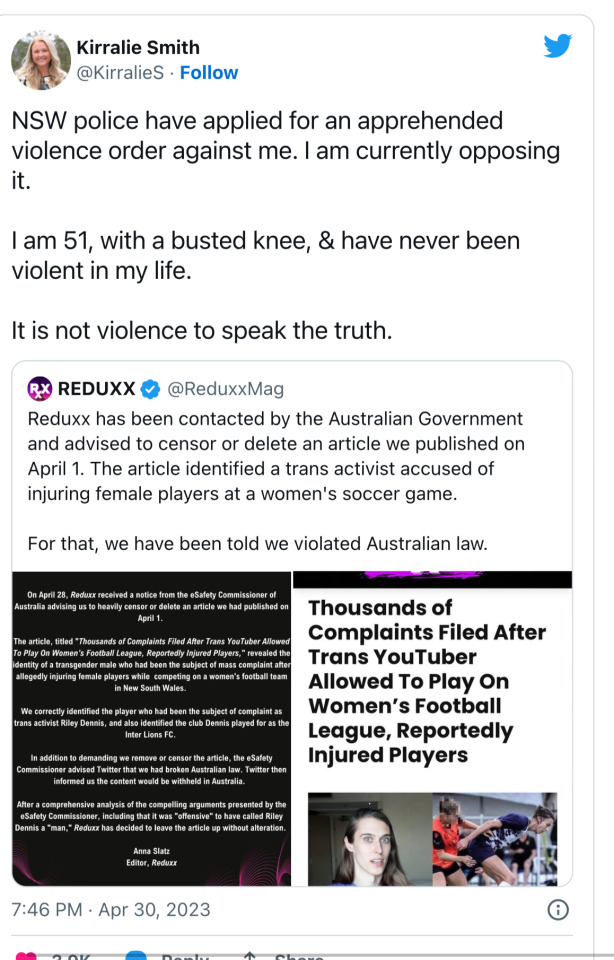
Included among the stipulations of the AVO lodged against Smith by Dennis are prohibitions against electronic harassment. As a result, her statements on social media have come under legal scrutiny and, in some cases, have been censored by an arm of the Australian government dedicated to combatting “cyber abuse.”
On February 20, Smith’s public Facebook page was removed at the request of Australia’s eSafety Commissioner, Julie Inman Grant. Smith had set up the page in 2016 and used the platform to advocate for the rights of women and girls being harmed by gender identity policies. At the time of its deletion, Smith’s page had over 47,000 followers.
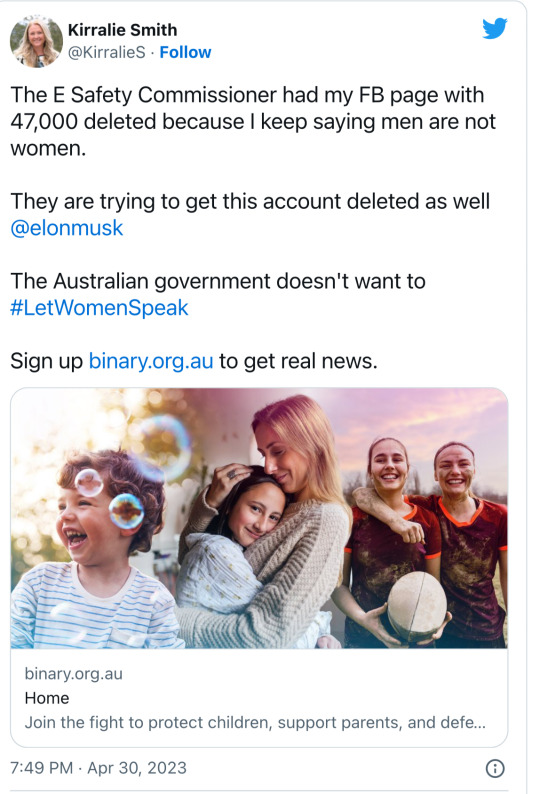
Smith expressed her shock and incredulity at the situation. If the court decides that the AVO is justified and that she has taken actions which breach the order, Smith could potentially have criminal charges leveled against her. However, she emphasized that she has received an outpouring of support.
“One good thing to come out of these difficulties is the way it draws women together. It isn’t about left or right, ethnicity or anything else. We are women and I now get to call some friends that I otherwise wouldn’t. Beauty from ashes,” Smith says.
The actions taken against Smith by eSafety Commissioner Grant are not the first instances of a government-endorsed push to digitally protect Dennis.
Last week, Reduxx was contacted by the eSafety Commissioner and advised to censor or delete an article naming Dennis as having been the subject of complaint after he was alleged to have injured female players during a match in March.
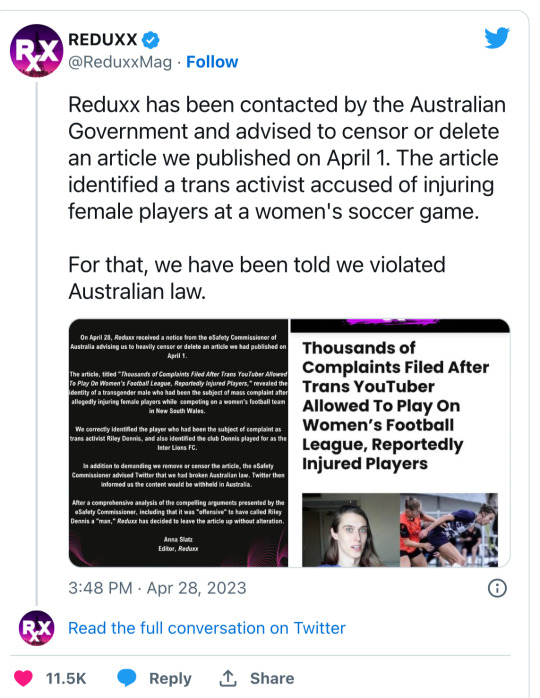
In the article targeted by the eSafety Commissioner, Reduxx had revealed that Dennis was one of as many as five trans-identified male players currently competing against women in Football New South Wales competitions. An initial report from The Daily Mail Australia had chosen not to identify him when reporting on the injuries he was alleged to have caused, censoring images of him and declining to provide his name. However, Reduxx confirmed the player’s identity using the censored images from The Daily Mail Australia report and cross-referencing them to Dennis’ social media.
Dennis was a popular trans activist YouTuber who amassed 113,000 subscribers on the platform. He has since stopped creating content but, during the height of his internet career, he received backlash for a controversial video in which he called “genital preferences” transphobic.
The video, titled Your Dating ‘Preferences’ Might Be Discriminatory and released in 2017, prompted outrage from lesbians who felt Dennis was attempting to guilt them into having sexual relationships with males.
In the video, Dennis, who identifies as a “transgender lesbian,” implied that sexual orientation is caused by societal prejudices and that it is discriminatory to exclude members of the opposite sex from your dating preferences if you are homosexual. Dennis deleted the video following widespread criticism.
In addition to Smith and Reduxx, pro-woman Reddit alternative Ovarit also received a censorship notice from the eSafety Commissioner.
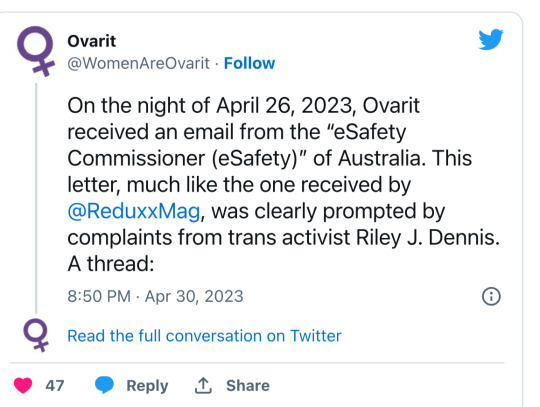
Ovarit posted the full contents of the email they had received to their platform. Amongst the grievances the eSafety Commissioner listed, Ovarit was warned because its users had “referred to Riley Dennis’ first name as ‘Rapey’ instead of “Riley” and have referred to her surname as ‘Penis’ instead of ‘Dennis.'”
The eSafety Commissioner targeted individual Ovarit users in its email to the platform, and appears to be demanding the users either have their comments deleted or be suspended. The email ends: “Notwithstanding this request for removal, eSafety reserves the option of exercising our regulatory options under the Online Safety Act 2021 (Cth).”
In addition to the censorship experienced by Smith, Reduxx, and Ovarit, concerned citizens and parents who have been participating in online discussions of Football New South Wales’ (FNSW) gender self-identification policy have been sent threatening “notices” urging them to remove social media posts.
A community that opposes the admission of males into female sports categories has congregated at the Facebook-based NSW NPL Banter Page.
A representative for the page spoke anonymously with Reduxx to confirm that there had been multiple reports from concerned individuals that the sporting authority had been warning critics that they may be “sanctioned” for their comments and posts on social media.
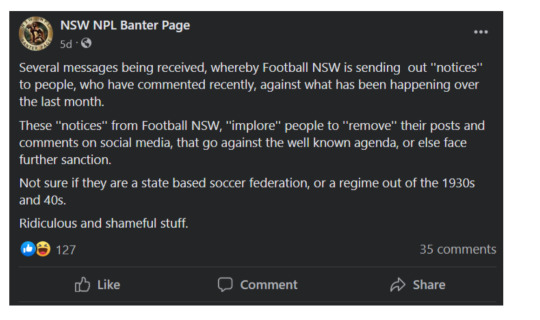
The NSW NPL Banter administrator was also sent an email notification of an “investigation” that FNSW claims to have opened into posts and comments made on the page. It stated that, according to 2023 FNSW’s Social Media Policy, a member of the organization “must not make public or media comment (including via social media) which is detrimental to Football New South Wales, Football Australia, their commercial partners or to the interests of the game.”
The message specified two posts which depicted “a participant with a phallus photoshopped onto their body” alongside the word “unacceptable” as evidence to support the investigation. It was further stated that comments considered subject to removal include those which “criticize” Football NSW, members or participants, or its policies.
The page’s creator also told Reduxx that, despite several attempts to share the article naming Dennis as a man playing on a women’s team, such posts were repeatedly deleted.
“We had put the article up on our Facebook page and it was deleted three times – after we had successfully challenged its removal two times previously,” the administrator said.
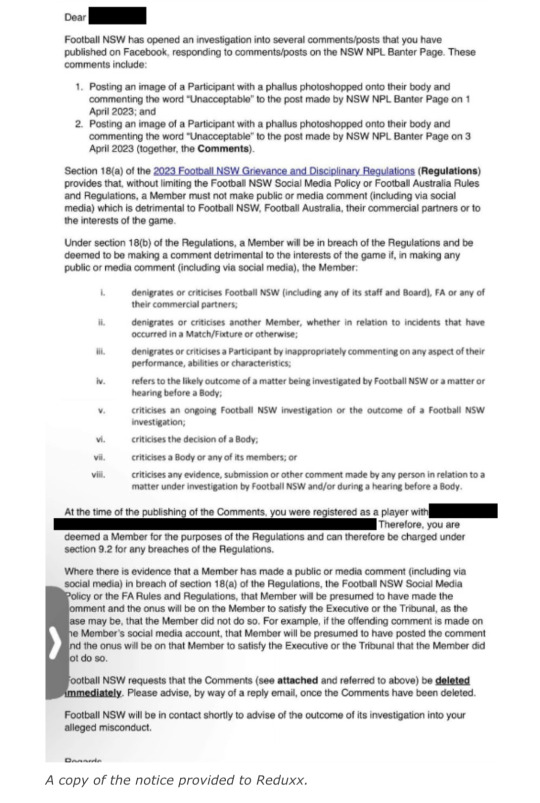
In the past few months, the page has published several posts critical of FNSW’s policy allowing men to compete against women. Though some have remained, many have been removed.
“Biological adult males and it’s not just one, it is several, are playing in NSW women’s state league competitions, which contain teenage girls and young women. Shame on those clubs, who have discarded any morals they might have had, just to sign these things, so as to be able to win, where’s the dignity? You put winning above respect for the competition,” the NSW NPL Banter Page wrote in a now-deleted post last month.
Responses to posts made on the page are overwhelmingly sympathetic to women and girls being forced to compete against men.
“I feel sorry for our young women who are at increased risk of injury and losing opportunities,” read one comment.
Referring specifically to Dennis, another concerned respondent said: “He put two girls in hospital and has scored 9 goals. What a joke.”
“The women who play this sport deserve better than playing with full grown adult men who have transitioned into women… This is cheating at the highest level and it angers me to my core,” said another commenter.
The issue of locker rooms was also brought up, as one woman replied, “What happens to a minor age female who is in the change room with a biologically born male in a senior team? Who is responsible for the duty of care toward those girls both on and off the field?”
On March 31, in response to demands from parents to ban trans-identified males from women’s matches for FNSW, Football Australia doubled down by announcing it would be developing a “transgender and gender-diverse high performance inclusion policy.”
The policy states that Football Australia intends to “deliver LGBTQI+ training and support resources to the football community” by way of a partnership with activist group Pride in Sport. “The aim of this training will be to provide the Australian Football community with a greater understanding of the lived experience of LGBTQI+ communities and their participation in sport,” the statement read.
On April 6, an individual who identifies himself as a referee stated in a forum dedicated to discussing Youth Football matches in the region that members of Football NSW were sent an email announcing an LGBTQ+ Online Training Session to be held the following week.
By Genevieve Gluck
Genevieve is the Co-Founder of Reduxx, and the outlet's Chief Investigative Journalist with a focused interest in pornography, sexual predators, and fetish subcultures. She is the creator of the podcast Women's Voices, which features news commentary and interviews regarding women's rights.
#May 3#World Press Freedom Day#australia#New South Wales#Kirralie Smith Spoke the truth#Football New South Wales (FNSW)#Apprehended Violence Order (AVO)#Calling a man a man is now cyber abuse#ESafety Commissioner#Facebook#Reduxx#It’s the Your Dating ‘Preferences’ Might Be Discriminatory guy#Ovarit#The Australian government may not be able to tell a man from a woman but they know who to censor
23 notes
·
View notes
Text

The lawsuit between Musk and the Australian government has been dropped.
https://www.news.com.au/technology/online/social/esafety-commissioner-drops-court-case-against-x-over-sydney-church-stabbing/news-story/f4559089adcab138401599b1fbd51f1c
4 notes
·
View notes
Link
Ethnolink has been awarded a 2-year contract with the Office of the eSafety Commissioner (eSafety) for the provision of translation services.
0 notes
Text
Australia’s online safety regulator has accused Apple and Google of financial motives in deciding not to remove Reddit and Elon Musk’s X from their app stores for hosting pornography in violation of their own policies.
Research cited in the eSafety commissioner’s online roadmap for age verification technology for adult sites last year reported that 41% of teens aged between 16 and 18 reported seeing pornography on X – more than the 37% who viewed pornography on dedicated adult sites.
Australia’s online safety regulator has accused Apple and Google of financial motives in deciding not to remove Reddit and Elon Musk’s X from their app stores for hosting pornography in violation of their own policies.
Research cited in the eSafety commissioner’s online roadmap for age verification technology for adult sites last year reported that 41% of teens aged between 16 and 18 reported seeing pornography on X – more than the 37% who viewed pornography on dedicated adult sites.
“There’s a huge disincentive right now for the app stores to actually follow their own [policies],” she said.
“They collect a 30% tithe from every transaction that happens on a social media site … Think about the force multiplier of deplatforming an app and what that would mean to their revenue.”
Google Play charges a 15% fee for the first US$1m earned by developers each year, increasing to 30% above that. Developers making Apple apps pay 15% if the revenue generated the previous year is lower than $1m, or 30% if they earn more than that.
Guardian Australia has sought comment from Apple, Google, X and Reddit. X and Reddit are free apps in both stores, but users can pay for a subscription or premium service through the apps which would attract the app store fees.
Under Apple’s developer guidelines, apps with user-generated, primarily pornographic content may be removed, but apps with user-generated adult content hidden by default may still be displayed. Both X and Reddit hide adult content by default.
Despite campaigns calling for age assurance technology trials to include social media for people under 16, the $6.5m trial of the technology announced in May’s budget by the federal government is unlikely to initially include social media sites, the Senate committee heard, with the initial focus to be on adult websites.
Bridget Gannon, the first assistant secretary for the online safety branch in the communications department, said the initial focus would be on online pornography and the effectiveness of technology to prevent people under 18 from accessing it.
There would be more consultation on what to do regarding social media, she said.
“There’s wide agreement there should be age limits on social media [but] there are different views on what that age should be … we’ll be doing some consultation and research to really nail down what that age should be, and then trial the available technologies to assess their effectiveness,” she said.
Gannon said the trial would examine different technologies, how to manage other issues such as privacy and security, and whether the intervention should be at the internet service provider level or the social media companies, or other type of services.
Gannon noted that in recent years there was an increasing reluctance for people to hand over identity information to companies, meaning they might seek to bypass any age assurance tech that uses ID.
“We will be working closely with industry as a whole but they won’t be undertaking the trial – we will be,” she said.
But the social media companies would be required to assure user ages, under codes developed under the Online Safety Act in parallel with the trial, Gannon said.
There is no date set on when the trial would end, but Gannon noted the trial was funded just for the 2024-2025 financial year. There was a risk if the technology was rushed out that it wouldn’t work, she said.
“There’s a risk that families and parents and carers have a false sense of security about the technologies that they have in place that they may place undue trust in a system thinking their children are being kept safe when actually their children can bypass it quite easily or it just doesn’t work.”
11 notes
·
View notes
Text
(This post contains non-graphic references to child sexual abuse.)
So okay, last year, when the eSafety commissioner was all like "hey so twitter failed to answer Australia's questions about how they meet the basic online safety expectations in relation to child sexual exploitation and abuse material and activity and we are going to try to fine them $610,500 for non-compliance," I deleted my remaining twitter account.
Now, to be clear, a number of big tech companies didn't come out of this process looking great. For some, the eSafety commissioner said there were gaps in their processes. For others, like Google, they said the answers to the questions in the notice were too vague and issued a formal warning.
However, Twitter just straight up did not answer several of the questions, "including the time it takes the platform to respond to reports of child sexual exploitation; the measures it has in place to detect child sexual exploitation in livestreams; and the tools and technologies it uses to detect child sexual exploitation material." [X]
Up until then I kept an empty twitter account for checking up on public posts. (Even after I decided I didn't want to actually spend time talking on twitter... I'm like a cat who likes to be tall to see what's going on!) But after learning about this, I felt uneasy about using the platform. I determined that, regardless of what cool art or conversations were going on over there that I wanted to view, I personally didn't want to use and tacitly endorse a platform that refused to respond to requests for basic information like this.
So I got rid of twitter. The end. (For me, at least. You can do what you want.)
But in context I find this interesting, because this is the first AO3 donations drive season I've seen since that happened, right?
So now I actually have a pretty clear idea of what an average guy (me!) does when they discover a platform they use has an unacceptably lax policy around CSEM content.
Listen, I'm not a moral pillar of my community. Something I learned about a platform made me uncomfortable and I stopped using it. That's barely even a moral stance. But what it tells me is that if people genuinely believed that AO3 was intentionally lax towards absolutely, truly morally unacceptable content (whatever that is, by their own personal reasoning), they'd be outta there like they were fired from a fucking cannon.
11 notes
·
View notes
Text
Australia and Elon Musk have escalated their war of words over censorship after an Australian court ordered social media platform X to remove footage of a church stabbing.
An Australian judge on Monday (April 22) ruled that X must block users worldwide from accessing videos of a knife attack on an Assyrian Christian bishop in Sydney after the country’s internet watchdog sought an injunction.
The Federal Court in Sydney granted the temporary global ban after X had said it would challenge eSafety Commissioner Julie Inman Grant’s notice to remove posts related to last week’s attack on Mar Mari Emmanuel.
Continue Reading
6 notes
·
View notes
Text
Australia unites against Musk to take down terror posts
By Dominic Giannini and Tess Ikonomou, 22 April 2024 4:00pm

Elon Musk says X will fight the eSafety commissioner's order to take down offensive content. (AP Photo)
Political unity against social media giant X for fighting to keep potentially harmful content online has reinvigorated a push to crack down on graphic material.
Leading politicians have taken aim at comments from X chief executive Elon Musk, with one labelling him an "egotistical billionaire".
The federal government and opposition have backed efforts for graphic content - including of a stabbing massacre at a Sydney shopping centre - to be taken down from X, formerly Twitter.
It has led to a renewed focus on a government bill that would have tackled misinformation online that was temporarily shelved after the opposition argued it went too far and impacted free speech.
Opposition communications spokesman David Coleman said the coalition was willing to work with the government to curtail violent content online.
He also wants the government to adopt an age verification trial "so fewer kids see this awful material".
X has raised concerns about censorship, the jurisdiction of Australian laws and edicts dictating what overseas users can see.
Powers allowing the eSafety commissioner to issue a global takedown order to companies that had servers hosted overseas were put in place to deal with a scenario such as this, Mr Coleman said.
X said it would challenge an order from the eSafety commissioner.
It said the commissioner did not have the authority to enforce what users could see globally, branding the move an "unlawful and dangerous approach".
Global takedown orders also violated the principle of an open internet and threatened free speech, it said.
The response has irked all sides of politics in Australia.
"It beggars belief, doesn't it, that this egotistical billionaire thinks it's more important for him to show whatever he wants on X or Twitter ... than to respect the victims of the crimes," Labor frontbencher Tanya Plibersek told Seven's Sunrise program.
Greens senator Sarah Hanson-Young called for Mr Musk to front an Australian parliamentary inquiry and answer questions about algorithms that help content go viral and garner attention.
"These laws need to get to the heart of the problem and that is the profits they make off the algorithms they use and the data that they use," she said.
"It's no wonder that Elon Musk, the narcissistic cowboy, thinks he can just give the middle finger to the Australian government because for too long, we've had little to no regulation."
Liberal frontbencher Simon Birmingham said the use of social media advanced algorithms and technology to quickly target users meant platforms should be able to "quickly and effectively remove content that is damaging and devastating to the social harmony and fabric of society".
"Particularly images such as terrorist attacks," Senator Birmingham told ABC TV.
"We should expect that, we should demand it and we will certainly back the government to put in place the types of powers or penalties that make social media companies pay attention."
He also rejected claims about censorship.
It was an "insulting and offensive argument" to say the removal of imagery of a terrorist attack was censorship and it should be left unfiltered for children and others to see, Senator Birmingham said.
There was also the potential images could be used to inspire future terrorists, create disharmony and be manipulated for propaganda, he added.
Lifeline 13 11 14
2 notes
·
View notes
Text
Why women? | eSafety Commissioner
https://www.esafety.gov.au/women/why-women#:~:text=Women%20are%20likely%20to%20experience,compared%20to%20men%20(12.6%25).
Read this on Why females are more often than not victims of online bullies. So sad the perpetrators are their peers (similar-aged females). Girl-on-girl violence! Isn't bad enough what males do to females now we delight in degrading each other???
🤮 DISGUSTED & Disappointed
Melanie
I protect my peace ✌️!
#eddie munson#eddie munson x reader#eddie munson fanfic#eddie munson stranger things#gvf fic#gvf fanfiction#gvf#greta van fleet#greta van fleet fan fiction#girls help#girls supporting girls#uplifting women#protect your peace
2 notes
·
View notes
Text
What impact did online gaming have on society?
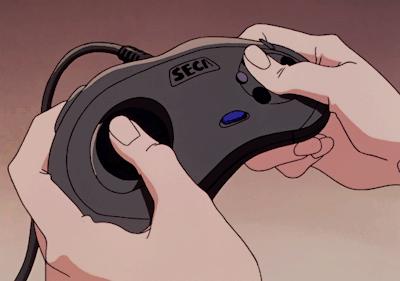
Any game that can be played over the Internet or a computer network is considered to be online gaming. The majority of the time, it refers to online multiplayer video games that include people from all over the globe. Online gambling via a poker room or casino can also be referred to as online gaming (Schurman 2022). Online gaming is growing in popularity for a variety of reasons. The development of gaming industry has attracted many teenagers and adults to view gaming as their necessities instead of a game that they play during their free time. In this blog, we will discover the cons and pros of the impact that gaming brings to the society.
To begin, gaming is actually an opportunity for young people to practice communication, improve thinking skills and conflict resolution skills. Even first-person shooting video games, which might not be suitable for young players or those under 18, teach teamwork, tolerance, and scenario-based learning. Most games involve strategy to comprehend and then comply with the rules. Online games may contribute in the development of cooperation, concentration, communication, commitment, leadership and problem-solving abilities, according to the Australian Office of the eSafety Commissioner, Think U Know UK, and the NZ organization Netsafe (The benefits of playing online games n.d). As stated, games may improve one’s thinking skills as it needs users to be aware of the environment, pay attention to detail, able to solve problems and to have backup plans as well as literacy.
Online gaming is often stereotyped as an isolated game, but it is actually more sociable than people realise. During the pandemic, people have found myriad ways to re-create-in-person socialization opportunities within video games, embracing the freedom of not being bound by geography or physical capabilities. Studies have found that playing video games can lead to more prosocial behaviors which is a behaviour that is positive, helpful, and aimed toward social acceptance (Wiederhold 2021). The shared experiences that social games provide can result in young people who are more inclined to help one another, in both online and real-world settings. In addition, social video games can increase the player's exposure to people from different regions and cultures. This is beneficial during a time when we are not able to socialize in school or to travel.
Although video games are recognized to offer certain advantages, as those described above, when they are used excessively, they may also have downsides. There are several possible risks associated with excessive gaming. Recent advancements have made it possible for gamers to access video games at any time and nearly anyplace, provided they have a play station portable console with them. Due to this, more time has been spent playing games, which might lead to addiction and an internet gaming disorder, associated with sleep loss, insomnia, and irregular circadian rhythms (Heiden, Braun, Muller & Egloff 2019).
In addition, a significant number of scientific research have found that regular exposure to violent video games raises the likelihood of aggressive behavior (Heiden, Braun, Muller & Egloff 2019). Children get normalised to violence as a result of this exposure, leading them to assume that the world is actually meaner and scarier than they actually are. It is frequently claimed that these ideas are difficult to overcome in later years. Kids start to believe that violence, as it is shown in the games, is typical behavior as a result.
The concept of violence in video games may be comparable to that of domestic abuse, where children exposed to violence may either act violently or become victims because they assume that what they encounter is the norm. The rise of these ideas in gamers has the potential to turn them violent and aggressive in the future.
To conclude, online gaming can bring both positive and negative impacts on the society. Users must control the amount of time and content of game they play. Always keep in mind in separating the gaming world from the real world so that addiction and violence could be reduced.
References:
Heiden JM, Braun, B, Muller, KW & Egloff, B 2019, ‘The Association Between Video Gaming and Psychological Functioning’, Original research, Department of Psychosomatic Medicine, University Medical Center, Mainz, Germany.
Schurman, K 2022, ‘What is Online Gaming?’, EasyTechJunkie, 27 October, viewed 26 November 2022, < https://www.easytechjunkie.com/what-is-online-gaming.htm>.
‘The benefits of playing online games’ n.d, Digital Citizenship, viewed 26 November 2022, <https://www.digitalcitizenship.nsw.edu.au/articles/the-benefits-of-playing-online-games>.
Wiederhold, BK 2021, ‘Kids Will Find a Way: The Benefits of Social Video Games’, Cyberpsychology, Behavior and Social Networking, vol. 24, no. 4.
2 notes
·
View notes
Text
By: Brendan O'Neill
Published: Apr 25, 2024
I’m in Australia at the moment, which means I am bound by Australian law. If I do something here that this great democratic nation has decreed to be a crime, I’m in hot water. And rightly so. Yet when I jet back to Britain in a week’s time, that will no longer be the case, right? Surely no Aussie lawmaker, no Aussie cop, no Aussie bureaucrat will enjoy jurisdiction over the behaviour of this free Brit some 10,000 miles away? Actually, they might, if Australia’s ‘eSafety commissioner’ has her way.
Australia’s top thoughtcop – let’s call a spade a spade – is one Julie Inman Grant. She has the power under the Online Safety Act 2021 to demand the removal of ‘Class 1 material’ from the internet. That’s anything that depicts ‘revolting or abhorrent phenomena [that] offend against the standards of morality, decency and propriety’. The vast bulk of what gets wiped off the web is child porn. Sometimes clips of violence are culled, too. Right now, Ms Inman Grant is seeking to excise a video of a stabbing. But here’s the twist: she doesn’t only want to block Aussie eyes from seeing it, but everyone’s eyes. Everyone in the world. All of us. Tyrant much?
The clip shows the horrible assault on the Assyrian bishop, Mar Mari Emmanuel. He was stabbed in his church in Sydney on 15 April allegedly by a teenage boy yelling ‘Allahu Akbar’. Emmanuel suffered grisly injuries but survived. The livestream of his sermon captured the stabbing and inevitably, it went viral. Ms Inman Grant has instructed both X (formerly Twitter) and Meta (owner of Facebook and Instagram) to take the clip down – everywhere. Meta has complied, but X has pushed back, on the sound basis that the Oz government should not get to dictate what every soul on Earth may see.
Elon Musk, boss of X and scourge of censors, has actually kind of complied with the commissioner’s instructions. He’s ‘geoblocked’ tweets that show the stabbing, meaning people in Oz can’t see them. Job done: Aussie censors don’t want Aussie folk watching this clip, and now they can’t. But that’s not good enough for Australia’s overlords of online safety. Australians could still use a VPN – a Virtual Private Network – to trick the internet into thinking they’re somewhere other than Australia and thus see the clip. So, they say, X must erase it everywhere, in every territory, for every population.
It is a truly extraordinary demand. Even the coverage in Musk-sceptical media outlets cannot help but capture the chilling nature of this act of global censorship. The eSafety commissioner is furious that clips of the stabbing are ‘still accessible globally’, reports the Guardian. She expects her rulings to ‘cover overseas content’ as well as Aussie content, says the ABC. In short, this local bureaucrat lusts after global power. She seeks dominion over all earthlings. You feel like you’ve wandered into Oceania.
Imagine the precedent it will set if the eSafety commissioner wins out over X (they’re currently warring in court). Might other governments likewise demand the global obliteration of social-media clips they consider offensive? Perhaps the Chinese government will instruct platforms everywhere to take down clips of violence from Tiananmen Square in 1989 – you know, to keep Chinese citizens ‘safe’ from such politically troublesome images. Maybe Iran will issue takedown orders for clips of its revolutionary guards visiting their theocratic violence on anti-hijab protesters. Giving local functionaries global power is a recipe for tyranny.
Fragile officialdom has long argued that the worldwide web threatens national sovereignty. This Wild West of content might infect our citizens’ hearts and minds with vile stuff, they say. And so they erect great firewalls to keep it out. And yet, the Oz v Musk case suggests it’s the web-wary censors of the 21st-century technocracy who are the true menace to democracy. Australia’s haughty insistence that a vid be erased everywhere shows staggering disregard for the laws and norms of other nations. It would make us the colonial subjects of an eSafety commissioner on the other side of the world. Our eyes would be covered by the long arm of Aussie bureaucracy. It is unnatural, irrational and unjust for any government to presume the authority to control what the citizens of other nations may see and say.
Call me a cynic, but I don’t believe the Aussie government cares all that much about this one video. Apart from anything else, huge numbers of Australians have seen it already – and they didn’t morally collapse as a consequence. Also, Bishop Emmanuel himself has said the video should not be taken down – surely his opinion counts? No, it seems to me that officialdom Down Under is exploiting this awful incident to try to clip the wings of social media, to bring to heel these platforms that are notoriously difficult to control. This spat is a Trojan Horse through which a government hopes to restore its censorial authority over modern media and us, its allegedly fragile users.
Witness the speed with which this clash morphed into a bigger discussion about the supposed scourge of unfettered speech online. They’re now arguing over ‘misinformation’. Australian PM Anthony Albanese thundered: ‘I find it extraordinary that X chose not to comply and are trying to argue their case… Australians want misinformation and disinformation to stop.’ What is he wittering on about? This clip is not ‘misinformation’. It shows a real event, that really happened.
That Australia’s rulers flit with such ease from blather about keeping people ‘safe’ from violent content to handwringing over ‘misinformation’ exposes their true motivation – not the protection of citizens from ‘harm’ but the protection of officialdom itself from images and ideas that make it feel uncomfortable. In this case, it seems pretty clear that the allegedly Islamist nature of the attack is a key factor in the government’s desire to memory-hole footage of it. They don’t want Australians having an open, frank discussion about radical Islam and the social disarray it springs from. Hide the video, stop the debate.
The very idea of an eSafety commissioner should horrify all who love liberty. It is not government’s job to keep us ‘safe’ from images and ideas. It is its job to keep us safe from threats and violence, but they’re often so busy policing words that they forget to police crime. The idea that every human being’s right to see an image of a suspected terror attack must be revoked in order to protect the feelings of some people in Australia is the definition of authoritarianism. Global freedom sacrificed at the altar of presumed sensitivity. Musk must prevail in his war with Australia’s bureaucracy.
==
BTW, Julie Inman Grant is a disgruntled ex-Twitter employee who has had it out for Twitter for years, long before Elon Musk took it over. She has a visceral authoritarian streak, seeking to use her overpaid position and un-elected power-grab to do to Twitter/X from afar what she couldn't do from within the first time around.
#Brendan O'Neill#Elon Musk#X#Twitter#censorship#Australia#Julie Inman Grant#authoritarianism#woke authoritarianism#Mar Mari Emmanuel#islam#islamic violence#jihad#free speech#freedom of speech#religion is a mental illness
4 notes
·
View notes
Text
0 notes
Text
Government Action Needed: Protect Australia's Democracy from Digital Platforms
New Post has been published on https://qnews.com.au/government-action-needed-protect-australias-democracy-from-digital-platforms/
Government Action Needed: Protect Australia's Democracy from Digital Platforms
Now is the time for decisive government action to protect Australia’s democratic values. We must prevent these platforms from eroding our information and media landscape.
Global digital platforms have failed us.
Australians value community and social cohesion. We need a social license for digital platforms, ensuring they operate as good corporate citizens. This includes paying fair taxes and contributing positively to our society.
Every day, millions of Australians turn to Instagram, Google, YouTube, TikTok, Facebook, and X for information. These platforms have become our modern town squares. However, unlike traditional town squares, these digital spaces aren’t governed by local people.
International corporations run these platforms, prioritising profits over Australian society and democracy. They foster harmful environments where social discord and misinformation flourish. Extreme content is amplified for engagement, while legitimate journalism struggles for visibility.
Digital platforms and their owners accumulate immense wealth and power. They avoid local taxes, laws, and regulations. For example, the ACCC reports Meta earned about $5 billion in Australia in 2022 but reported only $1.2 billion. They offshored about $3.8 billion to tax havens.
Home Affairs Minister Clare O’Neil stated that social media worsens many societal problems. She finds it unacceptable for tech giants to profit while causing social havoc. Governments are left to “pick up the pieces.”
image: Wiki Commons
Meta
Recently, Meta threatened to ban all professionally produced media content if designated under the News Media Bargaining Code.
This code aims to correct bargaining imbalances between digital platforms and Australian media. Assistant Treasurer Stephen Jones highlighted the gravity of this threat. Meta seems more intent on removing journalists than dangerous content.
The government is responding. Last month, Jones and Communications Minister Michelle Rowland announced the Albanese government’s joint select committee into social media. The committee investigates social media’s influence on Australian society. They consider Meta’s refusal to comply with the News Media Bargaining Code.
Australia can lead on this issue if the government remains steadfast. We must insist on a social license for digital platforms. They should carry professional, locally produced news with prominence. Stronger misinformation and disinformation laws and enhanced eSafety Commissioner powers will help restore balance.
Tech giants should contribute to the cost of professional journalism. They must support sustainable, quality media that keeps the public informed. The time for decisive government action is now. We must safeguard Australia’s democratic values and protect our media landscape. Government action is needed to protect our public interest journalism.
A social license is crucial for responsible corporate citizenship and a healthy, informed society. A strong, independent, and well-resourced media industry is vital for our town squares and democracy. Without it, our communities risk chaos. Let’s push for the changes needed to protect our future.
For the latest LGBTIQA+ Sister Girl and Brother Boy news, entertainment, community stories in Australia, visit qnews.com.au. Check out our latest magazines or find us on Facebook, Twitter, Instagram and YouTube.
0 notes
Text
Australia's eSafety Commissioner waters down child abuse and terror content detection rules on E2E encrypted services, after a push back from tech companies (Josh Taylor/The Guardian)
http://dlvr.it/T8ZCnZ
0 notes